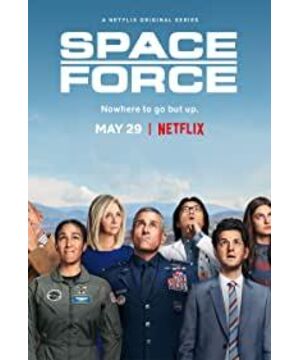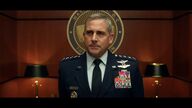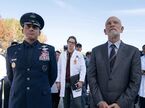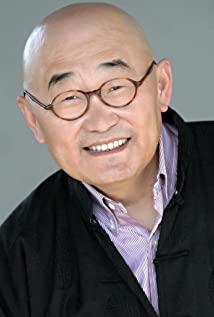"Space Force": MAGA main theme, the official idiot makes a big disaster
Thinking = Empty talk
The U.S. Space Force launched a satellite that was demolished the same day by an even larger Chinese satellite.
Seeing this, I burst out laughing. It's just that I don't know if this joke at the beginning of Space Force is good or bad.
It seems that once, a fictional well-informed person said that TV series satirizing the government is the second most boring drama in the world.
What is the first boring drama? A: TV dramas that praise the government.
When I watched the trailer for Space Force, I expected it to want to join the "Second Boring TV Show." Unexpectedly, after watching it, I felt that it seemed to be a "main theme drama" by Milliken. Of course, it is almost impossible to make it 100% praise the government, because it is a bit fake. The fictitious well-informed person also said: Government decisions will always make some people unhappy. How can there be 100% praise?
Don't say blind praise, self-deprecating light, will make the audience feel ungrounded. Therefore, those who are officials must be quite stupid, especially politicians, stupidity is interesting. Because politicians are too stupid, they have to listen to the people, not the people. - Of course, this is entertainment.
Comedies like "Space Force" are not suitable for "conservatives" (you factions) on either side to watch. Because after watching it, not only does it not feel funny, but also very angry. Milliken's "right" looked very angry: Has Uncle Sam been "backward" to this point? The "Rightist" of the Celestial Dynasty was also very angry when they saw it: the evil US has been smearing our country, doing a lot of evil and wanting to keep boasting, it's really angry.
Therefore, they all came to the same conclusion: the motherland must be great! Knock the opponent down!
This is not to say that the other positions do not want their own motherland to be strong, but that others are not as violent as the Jiyou faction. Watching the first season, Space Force ends up being a satire, or critique, of crude opposition.
The realistic background of "Space Force" is that Milliken established the Space Force (USSF) at the end of 2019. This can be seen as part of President Trump's slogan, "Make America Great Again (MAGA)." Of course, without MAGA, the Space Force would have to be there. In addition, using a president's slogan as the "main theme" does not seem to be in line with the Millikin culture. In particular, MAGA has been ridiculed and discriminated against by many people. What "Space Force" wants to do seems not to cater to the MAGA slogan of President Trump, but to express the so-called "American concept." It seems that this is the real Millician "theme".
Obviously I don't know what the Millician idea is, so here's just a few ramblings. Moreover, the so-called concept or spirit of a certain country does not mean that everyone agrees with it. Some argue that Trump undermined the notion that made Millikin "appear great." Whether it is true or not may be another matter.
The team in Space Force includes people from different cultures: Chinese, Japanese, Indians, Belgians, and even Russians. This may reflect the concept of "pragmatic tolerance". Not surprisingly, among these people, the Chinese scientist is the ugliest looking one. At the same time, when someone is suspected of being a spy, Chinese scientists are also the first to be suspected.
This is not surprising, after all, the biggest imaginary enemy of the whole drama is the Celestial Dynasty. However, the funny thing is that they did not suspect that the celestial dynasty sent spies, but that the Chinese scientist was a spy sent by India. One of the reasons was that both the celestial dynasty and India belonged to Asia.
Is there still "love of continentism" in the world? It seems that there is a "love of the ball", but there is really no "love of the continent".
"Space Force" is wary of Tianchao and Tianzhu, worried that the latter will surpass Millikin in aerospace achievements, but it does not seem to be very worried about Russia. Not only do not worry, but also cooperate with Russia, let Russia send people to participate in their space program. Such a setting may be a satire of Trump's "pro-Russia" policy on the one hand, and contempt for Russia on the other hand. Russia is said to have established a military service similar to the Space Force as early as 2001. So far, it doesn't seem to be considered a threat.
In "Space Force", there is a "use but not superstition" attitude towards technology. This corresponds to the attitude of dealing with rules in Milliken's concept, that is, the attitude of "pragmatism": knowing the rules, not superstitious rules. In the first episode of "Space Force", the difficulty faced by the four-star general's male protagonist is that his researchers insist that the weather conditions on the day are not conducive to the launch of the rocket, and the plan to launch the satellite should be cancelled. Even if there are "scientific objections", the male protagonist still insists on launching the satellite, and as a result, the satellite is successfully sent to the sky.
In other words, the "scientifically rigorous" view may not be valid in reality. In the second episode, was asked "why don't you trust scientists". The actor's answer is: Diet researchers often give contradictory advice. Today they say don't eat carbohydrates, and tomorrow they say they should only eat carbohydrates.
In this regard, the researchers present said: Because the research uses large sample data and long-term data, the diet science is inherently imprecise.
The statements made here should generally be in line with the facts. In fact, let alone non-scientists, a real scientist should not be superstitious about scientific conclusions. Because as said here, a study needs evidence to support, but the evidence is often imperfect, and the conclusions may be inconsistent and contradictory. Of course, this is not to say that you do not believe in scientific research at all.
Coincidentally, some time ago, there was a small debate around "don't eat porridge for breakfast" in China. There are supporters and opponents. People who support not eating porridge say that porridge is just carbohydrates, not nutritious. They think they have theoretical support in nutrition. Opponents question the notion of "no porridge for breakfast". It seems that some supporters lament that those opponents are "too ignorant" and "do not understand nutrition."
There seems to be no pure right or wrong here. Maybe? To be sure, scientists are not always magicians who get what they want. Obedience to authority (if there is one) does not seem to be a virtue to be proud of.
Some people regard the position of "not superstitious in scientists" as the position of "anti-authority". This equivalence does not seem accurate. However, people do not seem to deny that there is an element of "anti-authority" in Milliken's conception. From the perspective of negative criticism, Millikin's "anti-authority" is a manifestation of "abhorrent individualism". For the positive American spirit, this kind of "anti-authority" is justified in order to realize "conscience". There is no guarantee that authority will always have a conscience. At the end of the first season of "Space Force", the male lead also took "anti-authority" action. As for whether he can realize his "conscience", we can only watch it until the second season.
The "abominable individualism" of Space Force also seems to be reflected in its "Moon Expedition" composition. It stands to reason that the "moon expedition team" should be composed of people with "excellent character and study". Not here. The "Moon Expedition" in "Space Force" is led by a so-called "elite", and most of the members are "idiots" who act like they are heartless, a little crazy, and rarely rational. The situation is quite chaotic, but it does not worry about chaos. This also seems to be a typical feature of the American spirit: not rejecting chaos, but even accepting it, with an optimism to determine order from chaos.
However, judging from the confrontation between the Celestial Dynasty and Milliken in "Space Force", the situation is not optimistic. The premise of "Space Force" is that China's lunar development has been ahead of Milliken, and it has behaved quite tough; Milliken's camp is also controlled by hardliners; the tough confrontation between China and Milliken has occupied the mainstream. The result seems to be what is often advertised: fighting hurts both. As for the extent of the injury, we can only see it in the second season.
Looking forward to a better performance from the "dumb" in "Space Force" season 2.
View more about Space Force reviews











